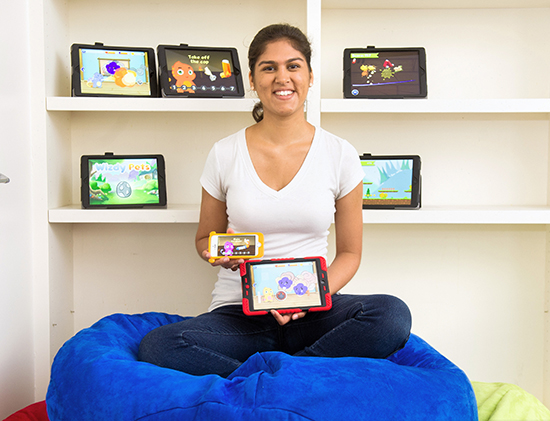Asthma—a chronic disease that causes wheezing, breathlessness, chest tightness, and coughing—affects approximately one in 10 kids in the United States, and that number is on the rise. The disease is the number one cause of pediatric emergency room visits in the country, and children with asthma missed more than 10 million days of school last year. But a 2008 study found that fewer than half of American adults and children with asthma were taught how to avoid triggers for the disease, underscoring the need for better education.
Now, Boston-based app development company Wizdy, cofounded by Nikita Virani (Questrom’14), has created a game for iPhones and Androids called Wizdy Pets that secretly educates kids about how to manage their asthma symptoms, as well as how to identify the warning signs of an impending attack. Virani and her team just completed a semester fine-tuning the app at Harvard University’s iLab.
“I believe the health care system focuses on treatment rather than prevention and education, which isn’t the best way to keep people healthy,” says company CEO Virani. “It’s important to empower kids to care for themselves by teaching things like avoiding triggers, inhaler technique and timing, trigger recognition, the signs of when you are about to have an asthma attack, and how to take the rescue medicine.”
As a BU undergrad, Virani studied finance and minored in public health. As a rising junior, she did a three-month internship with the World Health Organization’s Partnership for Maternal, Newborn & Child Health group, which piqued her interest in health issues affecting children.
While at BU, she met and became friends with Sean Chung, a Tufts student who was already developing apps. The two began to work together during Virani’s senior year to create an app that would help kids manage their own health, and they worked full time on the project after graduation.
Virani had seen the devastation of asthma up close: in high school, she witnessed a friend having an asthma attack during a track race. “At that moment I realized it was an issue,” she says. “There’s a stigma around this chronic condition, and asthma can be really serious. It’s a very common problem, but you can manage it through proper care.”
Those with asthma can prevent many attacks if they are taught to use inhaled corticosteroids and other prescribed daily medicines correctly and to avoid asthma triggers, which can include tobacco smoke, mold, and air pollution.

Nikita Virani and the Wizdy team consulted with advisors at Harvard Medical School and Boston Children’s Hospital on their game. Photo by Cydney Scott
Virani and Chung released Wizdy Pets in February. When the app is opened, an egg hatches into a dragon, which players adopt and name. The dragon has asthma and can’t properly breath fire if its asthma isn’t kept in check. Throughout the game, players go through different challenges, such as one that has them match cartoons of asthma triggers like pollen and smoke to the corresponding word, and another that has players ninja-slash asthma triggers, but not the rescue inhalers. The longer they play and the more points they rack up, the more fun options they can access, like dressing up their dragon and decorating its bedroom.
As they built the game, the Wizdy team consulted with advisors at Harvard Medical School and Boston Children’s Hospital, who advised them on the educational components the game should be sure to include, like proper inhaler technique and trigger recognition.
So far, testimonials from kids and their parents have been positive. One parent—who is also a pediatrician—credited the game with reminding her nine-year-old daughter to take her asthma medicine whether she is feeling well or not.
Virani and her team have just released a new game that targets food allergies: Wizdy Diner (also available for iPhones and Androids). In the game, players pretend to be a waiter serving alien customers who have food allergies. If an alien inadvertently receives a dish with something it is allergic to, it starts having a reaction, showing symptoms like swelling, vomiting, and hives, which in turn teaches players what to look out for in their own lives.
The Wizdy team has been tweaking the game based on user suggestions. Players receive new supplies during the game, but the team decided to adjust the way it’s done because they heard from a reviewer in the App Store that the process was confusing. “We definitely pride ourselves on being able to respond to feedback quickly,” Virani says. “Since we are a small team, users’ feedback still lands in our cofounders’ inboxes.”














































Related Stories
Helping Kids Get into College
SMG students’ College AppAssist gives high schoolers a boost
VA Honors Public Health Professor with Top Research Award
Cited for “exceptional achievement” in improving quality of health care for veterans
Former DOD Official Heads New BU Health Innovation Institute
Jonathan Woodson, brigadier general, was MED associate dean
Post Your Comment